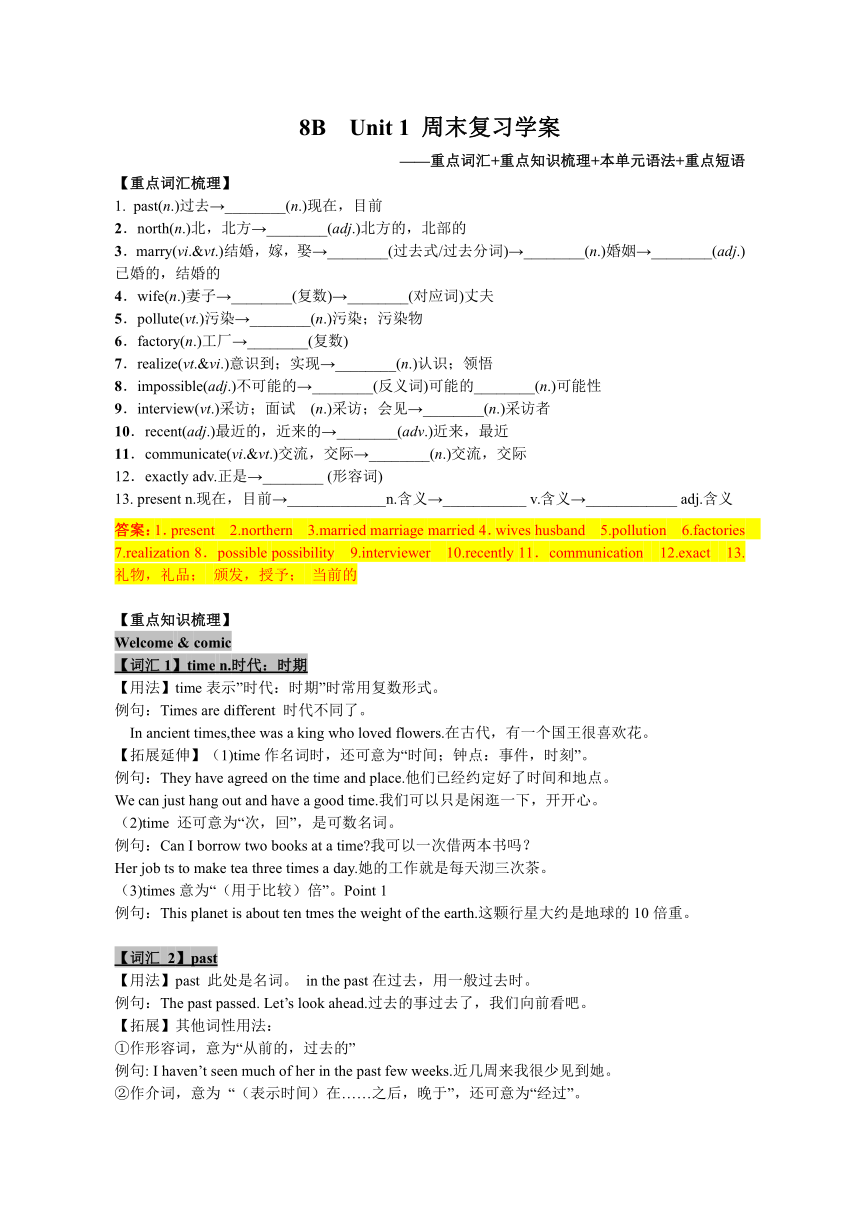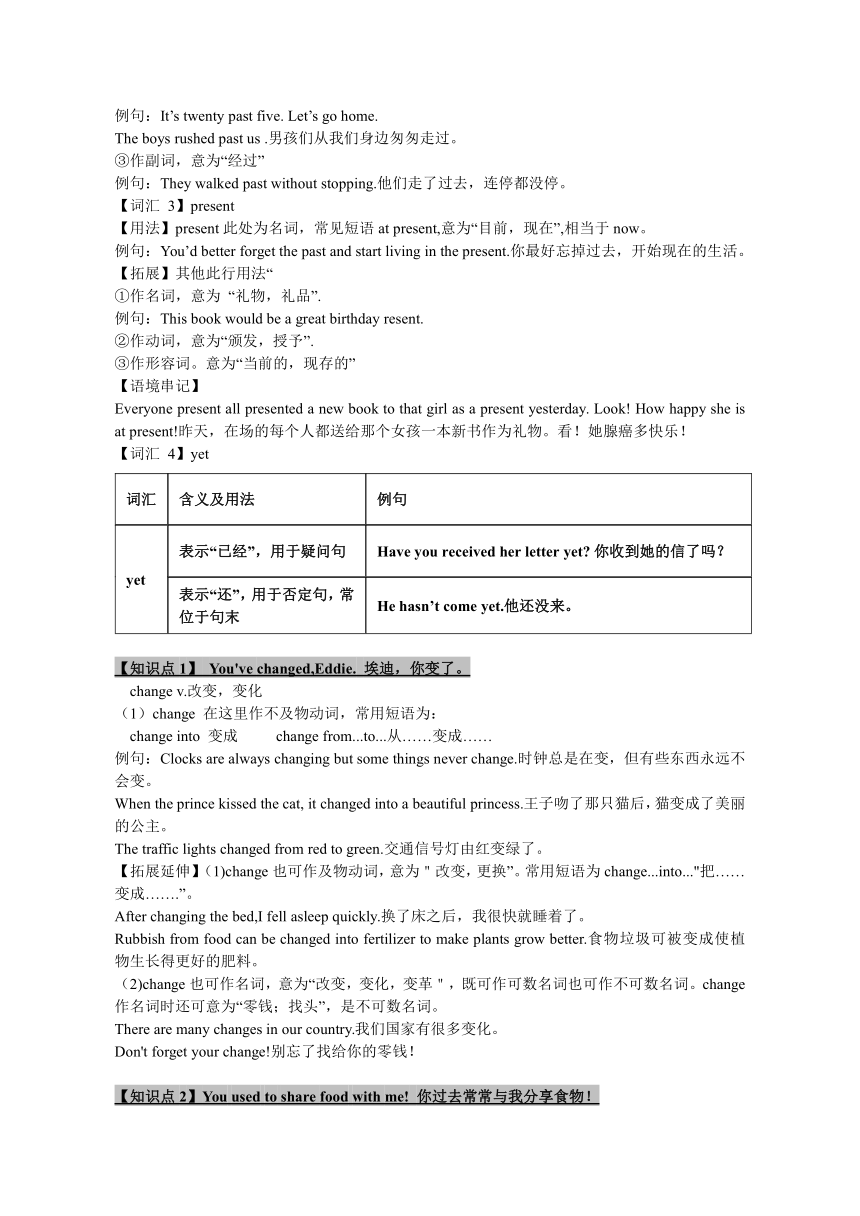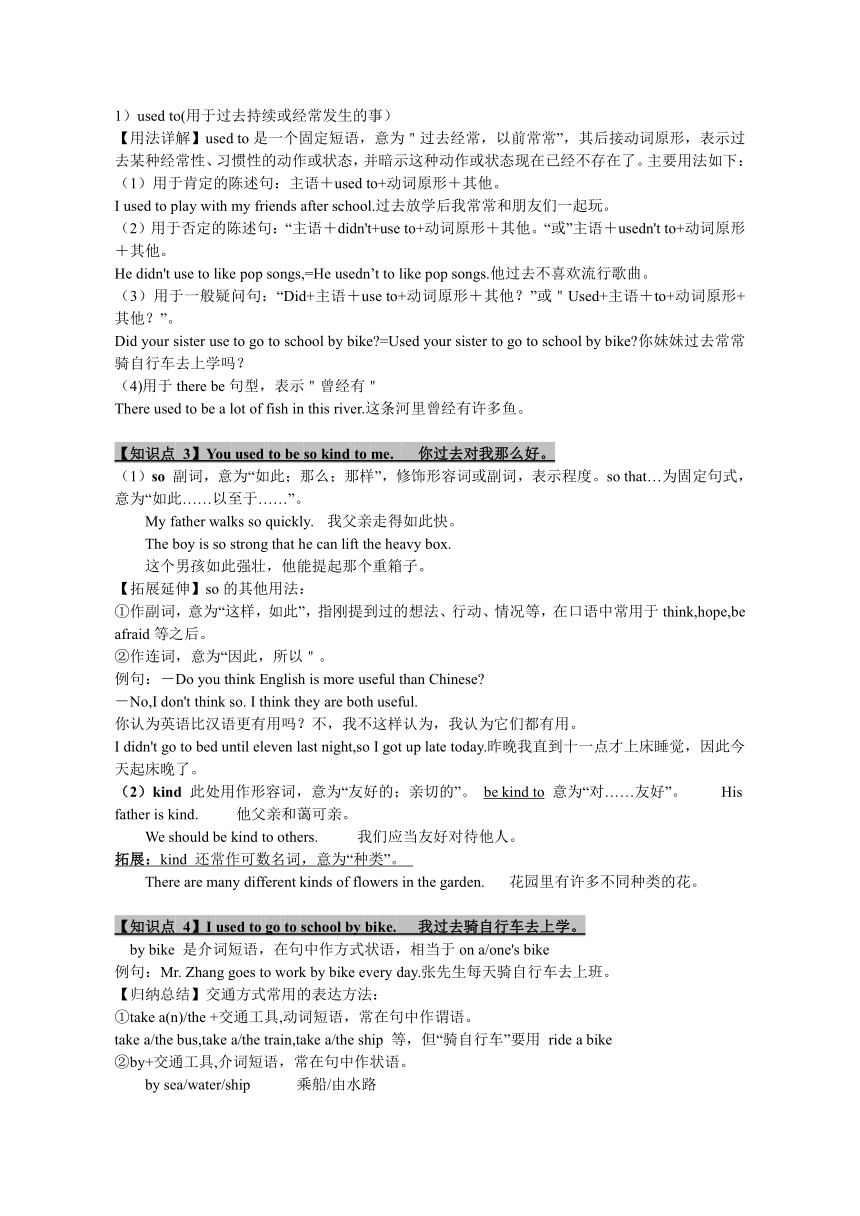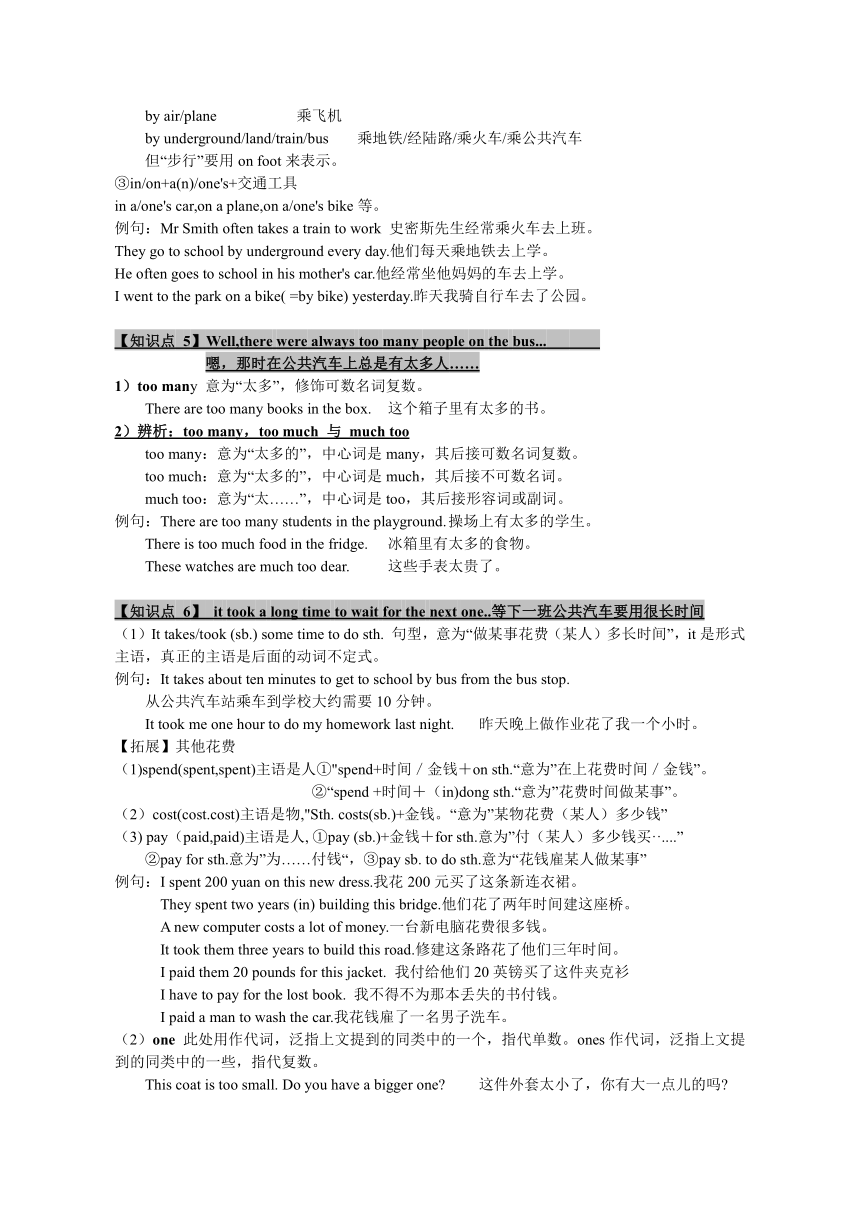2020-2021学年牛津译林版英语八年级下册复习讲义 Unit 1 Past and Present 重点-词汇-短语-知识点汇总 (含答案)
文档属性
| 名称 | 2020-2021学年牛津译林版英语八年级下册复习讲义 Unit 1 Past and Present 重点-词汇-短语-知识点汇总 (含答案) |  | |
| 格式 | docx | ||
| 文件大小 | 39.4KB | ||
| 资源类型 | 教案 | ||
| 版本资源 | 牛津译林版 | ||
| 科目 | 英语 | ||
| 更新时间 | 2021-03-03 16:19:25 | ||
图片预览




文档简介
8B Unit 1 周末复习学案
——重点词汇+重点知识梳理+本单元语法+重点短语
【重点词汇梳理】
past(n.)过去→________(n.)现在,目前
2.north(n.)北,北方→________(adj.)北方的,北部的
3.marry(vi.&vt.)结婚,嫁,娶→________(过去式/过去分词)→________(n.)婚姻→________(adj.)已婚的,结婚的
4.wife(n.)妻子→________(复数)→________(对应词)丈夫
5.pollute(vt.)污染→________(n.)污染;污染物
6.factory(n.)工厂→________(复数)
7.realize(vt.&vi.)意识到;实现→________(n.)认识;领悟
8.impossible(adj.)不可能的→________(反义词)可能的________(n.)可能性
9.interview(vt.)采访;面试 (n.)采访;会见→________(n.)采访者
10.recent(adj.)最近的,近来的→________(adv.)近来,最近
11.communicate(vi.&vt.)交流,交际→________(n.)交流,交际
12.exactly adv.正是→________ (形容词)
13. present n.现在,目前→_____________n.含义→___________ v.含义→____________ adj.含义
答案:1.present 2.northern 3.married marriage married 4.wives husband 5.pollution 6.factories 7.realization 8.possible possibility 9.interviewer 10.recently 11.communication 12.exact 13.礼物,礼品; 颁发,授予; 当前的
【重点知识梳理】
Welcome & comic
【词汇1】time n.时代:时期
【用法】time表示”时代:时期”时常用复数形式。
例句:Times are different 时代不同了。
In ancient times,thee was a king who loved flowers.在古代,有一个国王很喜欢花。
【拓展延伸】(1)time作名词时,还可意为“时间;钟点:事件,时刻”。
例句:They have agreed on the time and place.他们已经约定好了时间和地点。
We can just hang out and have a good time.我们可以只是闲逛一下,开开心。
(2)time 还可意为“次,回”,是可数名词。
例句:Can I borrow two books at a time?我可以一次借两本书吗?
Her job ts to make tea three times a day.她的工作就是每天沏三次茶。
(3)times意为“(用于比较)倍”。Point 1
例句:This planet is about ten tmes the weight of the earth.这颗行星大约是地球的10倍重。
【词汇 2】past
【用法】past 此处是名词。 in the past在过去,用一般过去时。
例句:The past passed. Let’s look ahead.过去的事过去了,我们向前看吧。
【拓展】其他词性用法:
①作形容词,意为“从前的,过去的”
例句: I haven’t seen much of her in the past few weeks.近几周来我很少见到她。
②作介词,意为 “(表示时间)在……之后,晚于”,还可意为“经过”。
例句:It’s twenty past five. Let’s go home.
The boys rushed past us .男孩们从我们身边匆匆走过。
③作副词,意为“经过”
例句:They walked past without stopping.他们走了过去,连停都没停。
【词汇 3】present
【用法】present此处为名词,常见短语at present,意为“目前,现在”,相当于now。
例句:You’d better forget the past and start living in the present.你最好忘掉过去,开始现在的生活。
【拓展】其他此行用法“
①作名词,意为 “礼物,礼品”.
例句:This book would be a great birthday resent.
②作动词,意为“颁发,授予”.
③作形容词。意为“当前的,现存的”
【语境串记】
Everyone present all presented a new book to that girl as a present yesterday. Look! How happy she is at present!昨天,在场的每个人都送给那个女孩一本新书作为礼物。看!她腺癌多快乐!
【词汇 4】yet
词汇
含义及用法
例句
yet
表示“已经”,用于疑问句
Have?you?received?her?letter?yet??你收到她的信了吗?
表示“还”,用于否定句,常位于句末
He?hasn’t?come?yet.他还没来。
【知识点1】 You've changed,Eddie. 埃迪,你变了。
change v.改变,变化
(1)change 在这里作不及物动词,常用短语为:
change into 变成 change from...to...从……变成……
例句:Clocks are always changing but some things never change.时钟总是在变,但有些东西永远不会变。
When the prince kissed the cat, it changed into a beautiful princess.王子吻了那只猫后,猫变成了美丽的公主。
The traffic lights changed from red to green.交通信号灯由红变绿了。
【拓展延伸】(1)change也可作及物动词,意为"改变,更换”。常用短语为change...into..."把……变成…….”。
After changing the bed,I fell asleep quickly.换了床之后,我很快就睡着了。
Rubbish from food can be changed into fertilizer to make plants grow better.食物垃圾可被变成使植物生长得更好的肥料。
(2)change也可作名词,意为“改变,变化,变革",既可作可数名词也可作不可数名词。change作名词时还可意为“零钱;找头”,是不可数名词。
There are many changes in our country.我们国家有很多变化。
Don't forget your change!别忘了找给你的零钱!
【知识点2】You used to share food with me! 你过去常常与我分享食物!
1)used to(用于过去持续或经常发生的事)
【用法详解】used to是一个固定短语,意为"过去经常,以前常常”,其后接动词原形,表示过去某种经常性、习惯性的动作或状态,并暗示这种动作或状态现在已经不存在了。主要用法如下:
(1)用于肯定的陈述句:主语+used to+动词原形+其他。
I used to play with my friends after school.过去放学后我常常和朋友们一起玩。
(2)用于否定的陈述句:“主语+didn't+use to+动词原形+其他。“或”主语+usedn't to+动词原形+其他。
He didn't use to like pop songs,=He usedn’t to like pop songs.他过去不喜欢流行歌曲。
(3)用于一般疑问句:“Did+主语+use to+动词原形+其他?”或"Used+主语+to+动词原形+其他?”。
Did your sister use to go to school by bike?=Used your sister to go to school by bike?你妹妹过去常常骑自行车去上学吗?
(4)用于there be句型,表示"曾经有"
There used to be a lot of fish in this river.这条河里曾经有许多鱼。
【知识点 3】You used to be so kind to me. 你过去对我那么好。
(1)so 副词,意为“如此;那么;那样”,修饰形容词或副词,表示程度。so that…为固定句式,意为“如此……以至于……”。
My father walks so quickly. 我父亲走得如此快。
The boy is so strong that he can lift the heavy box.
这个男孩如此强壮,他能提起那个重箱子。
【拓展延伸】so的其他用法:
①作副词,意为“这样,如此”,指刚提到过的想法、行动、情况等,在口语中常用于think,hope,be afraid等之后。
②作连词,意为“因此,所以"。
例句:-Do you think English is more useful than Chinese?
-No,I don't think so. I think they are both useful.
你认为英语比汉语更有用吗?不,我不这样认为,我认为它们都有用。
I didn't go to bed until eleven last night,so I got up late today.昨晚我直到十一点才上床睡觉,因此今天起床晚了。
(2)kind 此处用作形容词,意为“友好的;亲切的”。 be kind to 意为“对……友好”。 His father is kind. 他父亲和蔼可亲。
We should be kind to others. 我们应当友好对待他人。
拓展:kind 还常作可数名词,意为“种类”。
There are many different kinds of flowers in the garden. 花园里有许多不同种类的花。
【知识点 4】I used to go to school by bike. 我过去骑自行车去上学。
by bike 是介词短语,在句中作方式状语,相当于on a/one's bike
例句:Mr. Zhang goes to work by bike every day.张先生每天骑自行车去上班。
【归纳总结】交通方式常用的表达方法:
①take a(n)/the +交通工具,动词短语,常在句中作谓语。
take a/the bus,take a/the train,take a/the ship 等,但“骑自行车”要用 ride a bike
②by+交通工具,介词短语,常在句中作状语。
by sea/water/ship 乘船/由水路
by air/plane 乘飞机
by underground/land/train/bus 乘地铁/经陆路/乘火车/乘公共汽车
但“步行”要用on foot来表示。
③in/on+a(n)/one's+交通工具
in a/one's car,on a plane,on a/one's bike等。
例句:Mr Smith often takes a train to work 史密斯先生经常乘火车去上班。
They go to school by underground every day.他们每天乘地铁去上学。
He often goes to school in his mother's car.他经常坐他妈妈的车去上学。
I went to the park on a bike( =by bike) yesterday.昨天我骑自行车去了公园。
【知识点 5】Well,there were always too many people on the bus...
嗯,那时在公共汽车上总是有太多人……
1)too many 意为“太多”,修饰可数名词复数。
There are too many books in the box. 这个箱子里有太多的书。
2)辨析:too many,too much 与 much too
too many:意为“太多的”,中心词是many,其后接可数名词复数。
too much:意为“太多的”,中心词是much,其后接不可数名词。
much too:意为“太……”,中心词是too,其后接形容词或副词。
例句:There are too many students in the playground. 操场上有太多的学生。
There is too much food in the fridge. 冰箱里有太多的食物。
These watches are much too dear. 这些手表太贵了。
【知识点 6】 it took a long time to wait for the next one..等下一班公共汽车要用很长时间
(1)It takes/took (sb.) some time to do sth. 句型,意为“做某事花费(某人)多长时间”,it是形式主语,真正的主语是后面的动词不定式。
例句:It takes about ten minutes to get to school by bus from the bus stop.
从公共汽车站乘车到学校大约需要10分钟。
It took me one hour to do my homework last night. 昨天晚上做作业花了我一个小时。
【拓展】其他花费
(1)spend(spent,spent)主语是人①"spend+时间/金钱+on sth.“意为”在上花费时间/金钱”。
②“spend +时间+(in)dong sth.“意为”花费时间做某事”。
(2)cost(cost.cost)主语是物,"Sth. costs(sb.)+金钱。“意为”某物花费(某人)多少钱”
(3) pay(paid,paid)主语是人, ①pay (sb.)+金钱+for sth.意为”付(某人)多少钱买··....”
②pay for sth.意为”为……付钱“,③pay sb. to do sth.意为“花钱雇某人做某事”
例句:I spent 200 yuan on this new dress.我花200元买了这条新连衣裙。
They spent two years (in) building this bridge.他们花了两年时间建这座桥。
A new computer costs a lot of money.一台新电脑花费很多钱。
It took them three years to build this road.修建这条路花了他们三年时间。
I paid them 20 pounds for this jacket. 我付给他们20英镑买了这件夹克衫
I have to pay for the lost book. 我不得不为那本丢失的书付钱。
I paid a man to wash the car.我花钱雇了一名男子洗车。
(2)one 此处用作代词,泛指上文提到的同类中的一个,指代单数。ones作代词,泛指上文提到的同类中的一些,指代复数。
This coat is too small. Do you have a bigger one? 这件外套太小了,你有大一点儿的吗?
I don't like the coloured envelopes .I like the white ones.我不喜欢彩色信封,我喜欢白色的。
辨析: one 与it
one:泛指上文提及的同类事物中的一个,即同类异物。
I lost my pen. I must buy one. 我丢了我的钢笔,我必须买一支。
it:特指上文提到的同一事物,即同类同物。
The coat is hers. It’s very beautiful. 这件外套是她的,它非常漂亮。
Reading
【词汇 1】 since
(1)since 作连词,意为“自……以来”,引导的时间状语从句用一般过去时,主句用现在完成时,即主句(现在完成时)+since+从句(一般过去时)。
例句:He has studied very hard since he came to our school.他自来到我们学校以来就非常努力
【拓展】
①since 可作介词,意为“自……以来”,后接表示过去的时间点。since then 意为“从那时起”。
例句:We've known about it since May. 我们从5月份起就知道这件事了。
We haven't seen each other since then. 从那以后我们没有见过面。
②since 用作连词时,还可意为“既然,因为”,引导原因状语从句,语气比because弱。
例句:Since the rain has stopped,let's go for a walk. 既然雨停了,我们出去散散步吧。
Since we are young,we shouldn't be afraid of making mistakes.
既然我们还年轻,就不应该害怕犯错误。
注意:
如果说明某一动作或状态持续了多长时间,用“for + 一段时间”。
We have stayed in Shanghai for 3 days. 我们在上海已待了3天。
【知识点 1】When I got married in 1965,my wife and I moved two blocks away and we've lived in this area since then. 当我1965 年结婚时,我和我妻子搬到了两个街区以外,此后我们一直住在这里。
(1)get married 意为“结婚”。get/be married to意为“与某人结婚”。married形容词,意为“已婚的,结婚的”。
My parents got married in 1995. 我父母1995年结的婚。
When did she get married to the man? 她什么时候与那个男人结的婚?
注意:get married 表示动作,be married表示状态。当表示某人结婚多久与一段时间连用时,不能用 get married,而要用 be married。
—When did you get married? 你什么时候结的婚? —Two years ago.两年前。
—How long have you been married? 你结婚多久了? —For two years. 两年了。
(2)marry 可作及物动词,其后跟人作宾语,意为“嫁;娶;同……结婚,把……嫁给……”。marry sb. to sb.“把某人嫁给某人;使某人娶某人”。
She married a rich man. 她嫁给了一个有钱人。
The old man married her daughter to a foreigner. 那位老人把女儿嫁给了一个外国人。
(3)marry 也可作不及物动词,意为“结婚”。
He never married. 他终身未娶。
(4)move into 搬进 move to 搬到
move house 搬家 move out of ... 从……搬走
【知识点 2】Has the town changed a lot over the years? 近几年间这个城镇变化大吗?
(1)a lot 此处用作副词短语,意为“很,非常”,常修饰动词、感叹词或形容词/副词的比较级等,在句中作程度状语。
例句:It usually rains a lot in this area. 这个地区经常下很多雨。(修饰动词 rains)
Thanks a lot for the coffee.=Thank you very much for the coffee.多谢你请我喝咖啡。
Your room is a lot bigger than mine. 你的房间比我的大得多。(修饰比较级 bigger)
He runs a lot faster. 他跑得快多了。(修饰比较级 faster)
拓展:
①a lot意为“许多,大量”,在句中作主语、宾语或表语,其后可有动词不定式短语作后置定语。
例句:Sometimes we have very little snow,but sometimes there's a lot.
有时我们这儿雪很少,有时却又很多。(作主语)
You know a lot about English names.你知道许多有关英文名的情况。(作宾语)
②a lot of = lots of,意为“许多的,大量的”,都可修饰可数名词复数或不可数名词。
例句:There is a lot of/lots of water in the river. 河里有很多水。
(2)over the years意为“在这几年间”,over此处用作介词,意为“在……期间”。
He has grown into a big boy over the years. 几年间他已经长成了一个大男孩。
We are away over the New Year. 新年期间我们不在。
【知识点 3】There was once a steel factory near the Sunshine River 阳光河附近曾有一家钢铁厂。
(1)there be 句型表示“某时/某处有某物/某人”,表示存在关系。
例句:There are many people in the supermarket on Sundays. 在星期天,超市里有许多人。
【拓展】
①在there be句型中,there无词义;be 动词是谓语动词,be动词后面的名词是主语,两者必须在数上保持一致。若有两个或两个以上的名词作主语时,谓语动词与靠近它的那个名词一致,此原则被称为“就近原则”。
例句:There is a book on the desk. 书桌上有一本书。
There are fifty students in our class. 我们班有50 名学生。
There is a pen and two pencils in the box. 盒子里有一支钢笔和两支铅笔。
There are two pencils and a pen in the box. 盒子里有两支铅笔和一支钢笔。
② there be 句型中可以有情态动词。
There may be an important meeting here tomorrow. 明天这儿可能有一个重要的会议。
③there be句型可以有各种时态。
一般现在时:There is/are...
一般过去时:There was/were…
一般将来时:There will be...或 There is/are going to be...
现在完成时:There have/has been...
注意:There be结构的一般将来时不可写成:There will have...或There is/are going to have...
There was a dead dog on the road just now. 刚才路上有条狗死了。
There is going to be a birthday party tomorrow. 明天有一个生日聚会。
(2)once 此处用作副词,意为“一度;以前; 曾经”。
例句:They once lived in Hong Kong. 他们以前住在香港。
【拓展】
① once 作副词,还可意为“一次”。
Sarah goes swimming once a week. 萨拉每周去游泳一次。
②once 还可用作连词,意为“一旦……就……”,用于引导时间状语从句,相当于 as soon as。
Once she starts,she will never give up. 她一旦开始,就不会放弃。
【知识点 4】It has become impossible for us to see each other as often as before. 对于我们来说再像以前那样经常互相见面是不可能了。
(1)impossible形容词,意为“不可能的”。impossible 是由形容词 possible加否定前缀im-构成的。在英语中,形容词的否定前缀有un-,in-,im-,ir-,dis- 等。有些形容词加上相应的否定前缀,就构成其反义词,这种构词法称为派生法。
①大多数形容词加前缀un-构成反义词。
necessary—unnecessary(不必要的) friendly—unfriendly(不友好的)
②以c或e开头的形容词通常加前缀in-构成反义词。
correct—incorrect (不正确的) expensive—inexpensive(不昂贵的)
③以p开头的形容词通常加前缀im-构成反义词。
proper—improper(不合适的) polite—impolite (不礼貌的)
④以r开头的形容词通常加前缀 ir- 构成反义词。
regular—irregular(不规则的)
⑤有些形容词加前缀 dis- 构成反义词。
honest—dishonest(不诚实的)
注意:
含加否定前缀构成的形容词的句子不属于否定句。在改为反意疑问句时,附加问句部分仍用否定形式。
He is unhappy today, isn't he? 他今天不高兴,是吗?
(2)as...as...意为“像……一样……”,中间用形容词或副词原级。as...as...的否定形式是 not as/so.... as...,意为“不如……”。
例句:My younger sister is as tall as me. 我妹妹和我一样高。
Tom doesn't sing as/so well as Lucy. 汤姆唱歌不如露西唱得好。
(3)before 此处用作副词,意为“以前,过去”。as... as before 意为“和以前一样……”。 I haven't met you before. 我以前没见过你。
We went to help the old man as often as before.
我们像以前一样那么经常地去帮助那位老人。
【知识点 5】Now I feel a bit lonely from time to time. 现在我时不时会觉得有点儿孤独。
(1)lonely adj 孤独的,作表语 I feel a bit lonely 感到有点孤单
作定语,表示荒凉的、偏僻的、偏远的 a lonely village 一个遥远的村庄
(2)alone adj 独自一人的 when you are alone, you will feel lonely.
alone adv. 单独,独自=by oneself=on one’s own
例句:She lives alone in a lonely village, but she doesn’t feel lonely.
(3)a bit =a little +adj. a bit of =a little +n.
(5)not a little=very much not a bit =not at all
【知识点 6】Amazing changes have taken place in Sunshine Town.在阳光城发生了令人惊叹的变化。
(1)take place 意为“发生”,与happen 意思相近,但用法有区别。take place 常指经过安排而发生,而 happen 常指偶然发生,它们都没有被动语态。
Great changes have taken place in my hometown. 我的家乡发生了巨大变化。
Do you know what will happen in one hundred years? 你知道 100 年后会发生什么吗?
【拓展】
① take place 还可意为“举行”,相当于hold,但 hold 有被动语态。
例句:The World Cup takes place every four years.=The World Cup is held every four years.
世界杯每四年举行一次。
The school sports meeting took place/was held last week. 学校上周举行了运动会。
②take sb.'s place 或 take the place of sb.意为“代替某人”。
例句:The man was ill in hospital and his friend took his place.那个人生病住院了,他朋友代替了他。
【重点短语梳理】
与……分享……
在……的北部
从那以后
与某人结婚
这些年来
把……变成……
把……排入/放入……
采取行动做某事
在某种程度上
不时,偶尔
发生,举行
一生
听说
收到……的来信
在过去
从……回来
回到……
与某人保持联系
出国
流经
享受舒适的生活
独自,单独地
四处走动
share...with
in the northern part of=in the north of
since then
get/be married to
over the years
turn into/change into
put...into
take action to do sth
in some ways
from tie to fime
take place
all one’s life
hear of/about
hear from
in the past
return from
return to
keep in touch with
go abroad
run through
enjoy a comfortable life
on one’s own
go around
——重点词汇+重点知识梳理+本单元语法+重点短语
【重点词汇梳理】
past(n.)过去→________(n.)现在,目前
2.north(n.)北,北方→________(adj.)北方的,北部的
3.marry(vi.&vt.)结婚,嫁,娶→________(过去式/过去分词)→________(n.)婚姻→________(adj.)已婚的,结婚的
4.wife(n.)妻子→________(复数)→________(对应词)丈夫
5.pollute(vt.)污染→________(n.)污染;污染物
6.factory(n.)工厂→________(复数)
7.realize(vt.&vi.)意识到;实现→________(n.)认识;领悟
8.impossible(adj.)不可能的→________(反义词)可能的________(n.)可能性
9.interview(vt.)采访;面试 (n.)采访;会见→________(n.)采访者
10.recent(adj.)最近的,近来的→________(adv.)近来,最近
11.communicate(vi.&vt.)交流,交际→________(n.)交流,交际
12.exactly adv.正是→________ (形容词)
13. present n.现在,目前→_____________n.含义→___________ v.含义→____________ adj.含义
答案:1.present 2.northern 3.married marriage married 4.wives husband 5.pollution 6.factories 7.realization 8.possible possibility 9.interviewer 10.recently 11.communication 12.exact 13.礼物,礼品; 颁发,授予; 当前的
【重点知识梳理】
Welcome & comic
【词汇1】time n.时代:时期
【用法】time表示”时代:时期”时常用复数形式。
例句:Times are different 时代不同了。
In ancient times,thee was a king who loved flowers.在古代,有一个国王很喜欢花。
【拓展延伸】(1)time作名词时,还可意为“时间;钟点:事件,时刻”。
例句:They have agreed on the time and place.他们已经约定好了时间和地点。
We can just hang out and have a good time.我们可以只是闲逛一下,开开心。
(2)time 还可意为“次,回”,是可数名词。
例句:Can I borrow two books at a time?我可以一次借两本书吗?
Her job ts to make tea three times a day.她的工作就是每天沏三次茶。
(3)times意为“(用于比较)倍”。Point 1
例句:This planet is about ten tmes the weight of the earth.这颗行星大约是地球的10倍重。
【词汇 2】past
【用法】past 此处是名词。 in the past在过去,用一般过去时。
例句:The past passed. Let’s look ahead.过去的事过去了,我们向前看吧。
【拓展】其他词性用法:
①作形容词,意为“从前的,过去的”
例句: I haven’t seen much of her in the past few weeks.近几周来我很少见到她。
②作介词,意为 “(表示时间)在……之后,晚于”,还可意为“经过”。
例句:It’s twenty past five. Let’s go home.
The boys rushed past us .男孩们从我们身边匆匆走过。
③作副词,意为“经过”
例句:They walked past without stopping.他们走了过去,连停都没停。
【词汇 3】present
【用法】present此处为名词,常见短语at present,意为“目前,现在”,相当于now。
例句:You’d better forget the past and start living in the present.你最好忘掉过去,开始现在的生活。
【拓展】其他此行用法“
①作名词,意为 “礼物,礼品”.
例句:This book would be a great birthday resent.
②作动词,意为“颁发,授予”.
③作形容词。意为“当前的,现存的”
【语境串记】
Everyone present all presented a new book to that girl as a present yesterday. Look! How happy she is at present!昨天,在场的每个人都送给那个女孩一本新书作为礼物。看!她腺癌多快乐!
【词汇 4】yet
词汇
含义及用法
例句
yet
表示“已经”,用于疑问句
Have?you?received?her?letter?yet??你收到她的信了吗?
表示“还”,用于否定句,常位于句末
He?hasn’t?come?yet.他还没来。
【知识点1】 You've changed,Eddie. 埃迪,你变了。
change v.改变,变化
(1)change 在这里作不及物动词,常用短语为:
change into 变成 change from...to...从……变成……
例句:Clocks are always changing but some things never change.时钟总是在变,但有些东西永远不会变。
When the prince kissed the cat, it changed into a beautiful princess.王子吻了那只猫后,猫变成了美丽的公主。
The traffic lights changed from red to green.交通信号灯由红变绿了。
【拓展延伸】(1)change也可作及物动词,意为"改变,更换”。常用短语为change...into..."把……变成…….”。
After changing the bed,I fell asleep quickly.换了床之后,我很快就睡着了。
Rubbish from food can be changed into fertilizer to make plants grow better.食物垃圾可被变成使植物生长得更好的肥料。
(2)change也可作名词,意为“改变,变化,变革",既可作可数名词也可作不可数名词。change作名词时还可意为“零钱;找头”,是不可数名词。
There are many changes in our country.我们国家有很多变化。
Don't forget your change!别忘了找给你的零钱!
【知识点2】You used to share food with me! 你过去常常与我分享食物!
1)used to(用于过去持续或经常发生的事)
【用法详解】used to是一个固定短语,意为"过去经常,以前常常”,其后接动词原形,表示过去某种经常性、习惯性的动作或状态,并暗示这种动作或状态现在已经不存在了。主要用法如下:
(1)用于肯定的陈述句:主语+used to+动词原形+其他。
I used to play with my friends after school.过去放学后我常常和朋友们一起玩。
(2)用于否定的陈述句:“主语+didn't+use to+动词原形+其他。“或”主语+usedn't to+动词原形+其他。
He didn't use to like pop songs,=He usedn’t to like pop songs.他过去不喜欢流行歌曲。
(3)用于一般疑问句:“Did+主语+use to+动词原形+其他?”或"Used+主语+to+动词原形+其他?”。
Did your sister use to go to school by bike?=Used your sister to go to school by bike?你妹妹过去常常骑自行车去上学吗?
(4)用于there be句型,表示"曾经有"
There used to be a lot of fish in this river.这条河里曾经有许多鱼。
【知识点 3】You used to be so kind to me. 你过去对我那么好。
(1)so 副词,意为“如此;那么;那样”,修饰形容词或副词,表示程度。so that…为固定句式,意为“如此……以至于……”。
My father walks so quickly. 我父亲走得如此快。
The boy is so strong that he can lift the heavy box.
这个男孩如此强壮,他能提起那个重箱子。
【拓展延伸】so的其他用法:
①作副词,意为“这样,如此”,指刚提到过的想法、行动、情况等,在口语中常用于think,hope,be afraid等之后。
②作连词,意为“因此,所以"。
例句:-Do you think English is more useful than Chinese?
-No,I don't think so. I think they are both useful.
你认为英语比汉语更有用吗?不,我不这样认为,我认为它们都有用。
I didn't go to bed until eleven last night,so I got up late today.昨晚我直到十一点才上床睡觉,因此今天起床晚了。
(2)kind 此处用作形容词,意为“友好的;亲切的”。 be kind to 意为“对……友好”。 His father is kind. 他父亲和蔼可亲。
We should be kind to others. 我们应当友好对待他人。
拓展:kind 还常作可数名词,意为“种类”。
There are many different kinds of flowers in the garden. 花园里有许多不同种类的花。
【知识点 4】I used to go to school by bike. 我过去骑自行车去上学。
by bike 是介词短语,在句中作方式状语,相当于on a/one's bike
例句:Mr. Zhang goes to work by bike every day.张先生每天骑自行车去上班。
【归纳总结】交通方式常用的表达方法:
①take a(n)/the +交通工具,动词短语,常在句中作谓语。
take a/the bus,take a/the train,take a/the ship 等,但“骑自行车”要用 ride a bike
②by+交通工具,介词短语,常在句中作状语。
by sea/water/ship 乘船/由水路
by air/plane 乘飞机
by underground/land/train/bus 乘地铁/经陆路/乘火车/乘公共汽车
但“步行”要用on foot来表示。
③in/on+a(n)/one's+交通工具
in a/one's car,on a plane,on a/one's bike等。
例句:Mr Smith often takes a train to work 史密斯先生经常乘火车去上班。
They go to school by underground every day.他们每天乘地铁去上学。
He often goes to school in his mother's car.他经常坐他妈妈的车去上学。
I went to the park on a bike( =by bike) yesterday.昨天我骑自行车去了公园。
【知识点 5】Well,there were always too many people on the bus...
嗯,那时在公共汽车上总是有太多人……
1)too many 意为“太多”,修饰可数名词复数。
There are too many books in the box. 这个箱子里有太多的书。
2)辨析:too many,too much 与 much too
too many:意为“太多的”,中心词是many,其后接可数名词复数。
too much:意为“太多的”,中心词是much,其后接不可数名词。
much too:意为“太……”,中心词是too,其后接形容词或副词。
例句:There are too many students in the playground. 操场上有太多的学生。
There is too much food in the fridge. 冰箱里有太多的食物。
These watches are much too dear. 这些手表太贵了。
【知识点 6】 it took a long time to wait for the next one..等下一班公共汽车要用很长时间
(1)It takes/took (sb.) some time to do sth. 句型,意为“做某事花费(某人)多长时间”,it是形式主语,真正的主语是后面的动词不定式。
例句:It takes about ten minutes to get to school by bus from the bus stop.
从公共汽车站乘车到学校大约需要10分钟。
It took me one hour to do my homework last night. 昨天晚上做作业花了我一个小时。
【拓展】其他花费
(1)spend(spent,spent)主语是人①"spend+时间/金钱+on sth.“意为”在上花费时间/金钱”。
②“spend +时间+(in)dong sth.“意为”花费时间做某事”。
(2)cost(cost.cost)主语是物,"Sth. costs(sb.)+金钱。“意为”某物花费(某人)多少钱”
(3) pay(paid,paid)主语是人, ①pay (sb.)+金钱+for sth.意为”付(某人)多少钱买··....”
②pay for sth.意为”为……付钱“,③pay sb. to do sth.意为“花钱雇某人做某事”
例句:I spent 200 yuan on this new dress.我花200元买了这条新连衣裙。
They spent two years (in) building this bridge.他们花了两年时间建这座桥。
A new computer costs a lot of money.一台新电脑花费很多钱。
It took them three years to build this road.修建这条路花了他们三年时间。
I paid them 20 pounds for this jacket. 我付给他们20英镑买了这件夹克衫
I have to pay for the lost book. 我不得不为那本丢失的书付钱。
I paid a man to wash the car.我花钱雇了一名男子洗车。
(2)one 此处用作代词,泛指上文提到的同类中的一个,指代单数。ones作代词,泛指上文提到的同类中的一些,指代复数。
This coat is too small. Do you have a bigger one? 这件外套太小了,你有大一点儿的吗?
I don't like the coloured envelopes .I like the white ones.我不喜欢彩色信封,我喜欢白色的。
辨析: one 与it
one:泛指上文提及的同类事物中的一个,即同类异物。
I lost my pen. I must buy one. 我丢了我的钢笔,我必须买一支。
it:特指上文提到的同一事物,即同类同物。
The coat is hers. It’s very beautiful. 这件外套是她的,它非常漂亮。
Reading
【词汇 1】 since
(1)since 作连词,意为“自……以来”,引导的时间状语从句用一般过去时,主句用现在完成时,即主句(现在完成时)+since+从句(一般过去时)。
例句:He has studied very hard since he came to our school.他自来到我们学校以来就非常努力
【拓展】
①since 可作介词,意为“自……以来”,后接表示过去的时间点。since then 意为“从那时起”。
例句:We've known about it since May. 我们从5月份起就知道这件事了。
We haven't seen each other since then. 从那以后我们没有见过面。
②since 用作连词时,还可意为“既然,因为”,引导原因状语从句,语气比because弱。
例句:Since the rain has stopped,let's go for a walk. 既然雨停了,我们出去散散步吧。
Since we are young,we shouldn't be afraid of making mistakes.
既然我们还年轻,就不应该害怕犯错误。
注意:
如果说明某一动作或状态持续了多长时间,用“for + 一段时间”。
We have stayed in Shanghai for 3 days. 我们在上海已待了3天。
【知识点 1】When I got married in 1965,my wife and I moved two blocks away and we've lived in this area since then. 当我1965 年结婚时,我和我妻子搬到了两个街区以外,此后我们一直住在这里。
(1)get married 意为“结婚”。get/be married to意为“与某人结婚”。married形容词,意为“已婚的,结婚的”。
My parents got married in 1995. 我父母1995年结的婚。
When did she get married to the man? 她什么时候与那个男人结的婚?
注意:get married 表示动作,be married表示状态。当表示某人结婚多久与一段时间连用时,不能用 get married,而要用 be married。
—When did you get married? 你什么时候结的婚? —Two years ago.两年前。
—How long have you been married? 你结婚多久了? —For two years. 两年了。
(2)marry 可作及物动词,其后跟人作宾语,意为“嫁;娶;同……结婚,把……嫁给……”。marry sb. to sb.“把某人嫁给某人;使某人娶某人”。
She married a rich man. 她嫁给了一个有钱人。
The old man married her daughter to a foreigner. 那位老人把女儿嫁给了一个外国人。
(3)marry 也可作不及物动词,意为“结婚”。
He never married. 他终身未娶。
(4)move into 搬进 move to 搬到
move house 搬家 move out of ... 从……搬走
【知识点 2】Has the town changed a lot over the years? 近几年间这个城镇变化大吗?
(1)a lot 此处用作副词短语,意为“很,非常”,常修饰动词、感叹词或形容词/副词的比较级等,在句中作程度状语。
例句:It usually rains a lot in this area. 这个地区经常下很多雨。(修饰动词 rains)
Thanks a lot for the coffee.=Thank you very much for the coffee.多谢你请我喝咖啡。
Your room is a lot bigger than mine. 你的房间比我的大得多。(修饰比较级 bigger)
He runs a lot faster. 他跑得快多了。(修饰比较级 faster)
拓展:
①a lot意为“许多,大量”,在句中作主语、宾语或表语,其后可有动词不定式短语作后置定语。
例句:Sometimes we have very little snow,but sometimes there's a lot.
有时我们这儿雪很少,有时却又很多。(作主语)
You know a lot about English names.你知道许多有关英文名的情况。(作宾语)
②a lot of = lots of,意为“许多的,大量的”,都可修饰可数名词复数或不可数名词。
例句:There is a lot of/lots of water in the river. 河里有很多水。
(2)over the years意为“在这几年间”,over此处用作介词,意为“在……期间”。
He has grown into a big boy over the years. 几年间他已经长成了一个大男孩。
We are away over the New Year. 新年期间我们不在。
【知识点 3】There was once a steel factory near the Sunshine River 阳光河附近曾有一家钢铁厂。
(1)there be 句型表示“某时/某处有某物/某人”,表示存在关系。
例句:There are many people in the supermarket on Sundays. 在星期天,超市里有许多人。
【拓展】
①在there be句型中,there无词义;be 动词是谓语动词,be动词后面的名词是主语,两者必须在数上保持一致。若有两个或两个以上的名词作主语时,谓语动词与靠近它的那个名词一致,此原则被称为“就近原则”。
例句:There is a book on the desk. 书桌上有一本书。
There are fifty students in our class. 我们班有50 名学生。
There is a pen and two pencils in the box. 盒子里有一支钢笔和两支铅笔。
There are two pencils and a pen in the box. 盒子里有两支铅笔和一支钢笔。
② there be 句型中可以有情态动词。
There may be an important meeting here tomorrow. 明天这儿可能有一个重要的会议。
③there be句型可以有各种时态。
一般现在时:There is/are...
一般过去时:There was/were…
一般将来时:There will be...或 There is/are going to be...
现在完成时:There have/has been...
注意:There be结构的一般将来时不可写成:There will have...或There is/are going to have...
There was a dead dog on the road just now. 刚才路上有条狗死了。
There is going to be a birthday party tomorrow. 明天有一个生日聚会。
(2)once 此处用作副词,意为“一度;以前; 曾经”。
例句:They once lived in Hong Kong. 他们以前住在香港。
【拓展】
① once 作副词,还可意为“一次”。
Sarah goes swimming once a week. 萨拉每周去游泳一次。
②once 还可用作连词,意为“一旦……就……”,用于引导时间状语从句,相当于 as soon as。
Once she starts,she will never give up. 她一旦开始,就不会放弃。
【知识点 4】It has become impossible for us to see each other as often as before. 对于我们来说再像以前那样经常互相见面是不可能了。
(1)impossible形容词,意为“不可能的”。impossible 是由形容词 possible加否定前缀im-构成的。在英语中,形容词的否定前缀有un-,in-,im-,ir-,dis- 等。有些形容词加上相应的否定前缀,就构成其反义词,这种构词法称为派生法。
①大多数形容词加前缀un-构成反义词。
necessary—unnecessary(不必要的) friendly—unfriendly(不友好的)
②以c或e开头的形容词通常加前缀in-构成反义词。
correct—incorrect (不正确的) expensive—inexpensive(不昂贵的)
③以p开头的形容词通常加前缀im-构成反义词。
proper—improper(不合适的) polite—impolite (不礼貌的)
④以r开头的形容词通常加前缀 ir- 构成反义词。
regular—irregular(不规则的)
⑤有些形容词加前缀 dis- 构成反义词。
honest—dishonest(不诚实的)
注意:
含加否定前缀构成的形容词的句子不属于否定句。在改为反意疑问句时,附加问句部分仍用否定形式。
He is unhappy today, isn't he? 他今天不高兴,是吗?
(2)as...as...意为“像……一样……”,中间用形容词或副词原级。as...as...的否定形式是 not as/so.... as...,意为“不如……”。
例句:My younger sister is as tall as me. 我妹妹和我一样高。
Tom doesn't sing as/so well as Lucy. 汤姆唱歌不如露西唱得好。
(3)before 此处用作副词,意为“以前,过去”。as... as before 意为“和以前一样……”。 I haven't met you before. 我以前没见过你。
We went to help the old man as often as before.
我们像以前一样那么经常地去帮助那位老人。
【知识点 5】Now I feel a bit lonely from time to time. 现在我时不时会觉得有点儿孤独。
(1)lonely adj 孤独的,作表语 I feel a bit lonely 感到有点孤单
作定语,表示荒凉的、偏僻的、偏远的 a lonely village 一个遥远的村庄
(2)alone adj 独自一人的 when you are alone, you will feel lonely.
alone adv. 单独,独自=by oneself=on one’s own
例句:She lives alone in a lonely village, but she doesn’t feel lonely.
(3)a bit =a little +adj. a bit of =a little +n.
(5)not a little=very much not a bit =not at all
【知识点 6】Amazing changes have taken place in Sunshine Town.在阳光城发生了令人惊叹的变化。
(1)take place 意为“发生”,与happen 意思相近,但用法有区别。take place 常指经过安排而发生,而 happen 常指偶然发生,它们都没有被动语态。
Great changes have taken place in my hometown. 我的家乡发生了巨大变化。
Do you know what will happen in one hundred years? 你知道 100 年后会发生什么吗?
【拓展】
① take place 还可意为“举行”,相当于hold,但 hold 有被动语态。
例句:The World Cup takes place every four years.=The World Cup is held every four years.
世界杯每四年举行一次。
The school sports meeting took place/was held last week. 学校上周举行了运动会。
②take sb.'s place 或 take the place of sb.意为“代替某人”。
例句:The man was ill in hospital and his friend took his place.那个人生病住院了,他朋友代替了他。
【重点短语梳理】
与……分享……
在……的北部
从那以后
与某人结婚
这些年来
把……变成……
把……排入/放入……
采取行动做某事
在某种程度上
不时,偶尔
发生,举行
一生
听说
收到……的来信
在过去
从……回来
回到……
与某人保持联系
出国
流经
享受舒适的生活
独自,单独地
四处走动
share...with
in the northern part of=in the north of
since then
get/be married to
over the years
turn into/change into
put...into
take action to do sth
in some ways
from tie to fime
take place
all one’s life
hear of/about
hear from
in the past
return from
return to
keep in touch with
go abroad
run through
enjoy a comfortable life
on one’s own
go around
